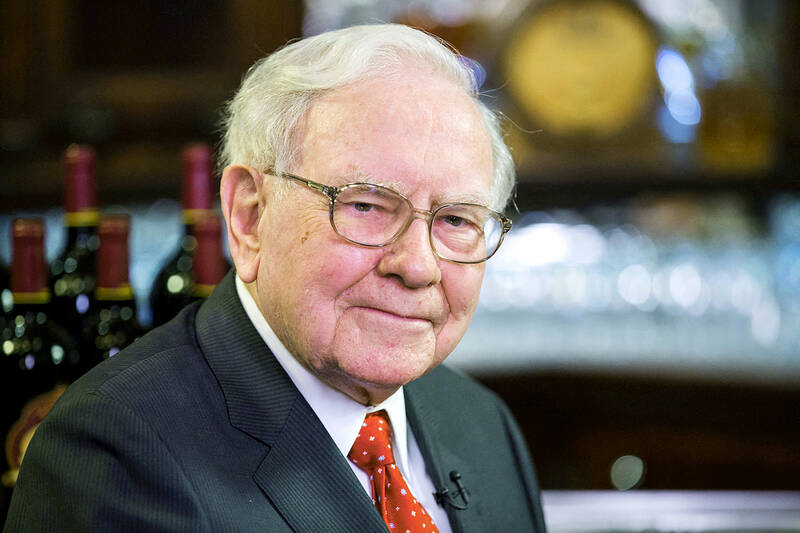Warren Buffett said he prefers deploying capital in Japan instead of Taiwan, lamenting how geopolitics led his firm to cut stakes in the nation’s chipmaker giant.
Taiwan Semiconductor Manufacturing Co (TSMC, 台積電) is one of the best-managed and most important companies in the world, Buffett said at Berkshire Hathaway Inc’s annual general meeting in Omaha, Nebraska, on Saturday.
“There’s nobody in the chip industry that’s in their league,” he said.

Photo: Reuters
That did not stop Berkshire from slashing its holding in TSMC by 86 percent during the fourth quarter of last year, after reporting a US$5 billion investment in November last year — a move Buffett has blamed on rising tensions between Taiwan and China.
Buffett urged China and the US to keep a lid on their rivalry.
“It’s imperative that China and the United States both understand what the game is, and that you can’t push too hard,” he said at the meeting. “Both places are going to be competitive and both can prosper.”
Speaking at the same event, Buffett’s longtime business partner Charlie Munger called for “reciprocal kindness” between the two superpowers.
In Taipei, Deputy Minister of Economic Affairs Lin Chuan-neng (林全能) said at a meeting of the legislature’s Finance Committee yesterday that the government would strive to let the world know that Taiwan is safe and stable.
TSMC would continue to spur technological development in Taiwan and maximize synergy in the nation, Lin said.
“Geopolitical developments cannot be controlled, but the government will continue to maintain TSMC’s core competitiveness in Taiwan and create the value of TSMC in the global industrial chain,” the Central News Agency (CNA) quoted Lin as saying.
National Development Council Deputy Minister Shih Keh-her (施克和) at the same meeting said that Buffett’s remarks represent an investor’s opinion, part of which affirms TSMC’s key role in the global supply chain, while also emphasizing the importance of Taiwan’s security, CNA reported.
Meanwhile, Buffett signaled a willingness to make further investments in Japan after recently raising stakes in trading companies there.
Berkshire owns 7.4 percent of those businesses, but would not go over 9 percent, he said.
Greg Abel, the heir apparent to Buffett who joined him on a trip to Japan last month, called them “an incredible” investment.
Buffett said he wanted to introduce Abel to executives from the five trading houses, recognizing that there would be continued investments and relationships there.
Japan’s trading houses — or sogo shosha — have deep roots in the country’s economy, dating back hundreds of years, and provide everything from food to energy.
“The Japanese thing was simple,” Buffett said. “I like looking at companies. I like looking at figures about companies.”
Additional reporting by staff writer

Taiwanese suppliers to Taiwan Semiconductor Manufacturing Co. (TSMC, 台積電) are expected to follow the contract chipmaker’s step to invest in the US, but their relocation may be seven to eight years away, Minister of Economic Affairs J.W. Kuo (郭智輝) said yesterday. When asked by opposition Chinese Nationalist Party (KMT) Legislator Niu Hsu-ting (牛煦庭) in the legislature about growing concerns that TSMC’s huge investments in the US will prompt its suppliers to follow suit, Kuo said based on the chipmaker’s current limited production volume, it is unlikely to lead its supply chain to go there for now. “Unless TSMC completes its planned six

Intel Corp has named Tasha Chuang (莊蓓瑜) to lead Intel Taiwan in a bid to reinforce relations between the company and its Taiwanese partners. The appointment of Chuang as general manager for Intel Taiwan takes effect on Thursday, the firm said in a statement yesterday. Chuang is to lead her team in Taiwan to pursue product development and sales growth in an effort to reinforce the company’s ties with its partners and clients, Intel said. Chuang was previously in charge of managing Intel’s ties with leading Taiwanese PC brand Asustek Computer Inc (華碩), which included helping Asustek strengthen its global businesses, the company

Power supply and electronic components maker Delta Electronics Inc (台達電) yesterday said second-quarter revenue is expected to surpass the first quarter, which rose 30 percent year-on-year to NT$118.92 billion (US$3.71 billion). Revenue this quarter is likely to grow, as US clients have front-loaded orders ahead of US President Donald Trump’s planned tariffs on Taiwanese goods, Delta chairman Ping Cheng (鄭平) said at an earnings conference in Taipei, referring to the 90-day pause in tariff implementation Trump announced on April 9. While situations in the third and fourth quarters remain unclear, “We will not halt our long-term deployments and do not plan to

TikTok abounds with viral videos accusing prestigious brands of secretly manufacturing luxury goods in China so they can be sold at cut prices. However, while these “revelations” are spurious, behind them lurks a well-oiled machine for selling counterfeit goods that is making the most of the confusion surrounding trade tariffs. Chinese content creators who portray themselves as workers or subcontractors in the luxury goods business claim that Beijing has lifted confidentiality clauses on local subcontractors as a way to respond to the huge hike in customs duties imposed on China by US President Donald Trump. They say this Chinese decision, of which Agence